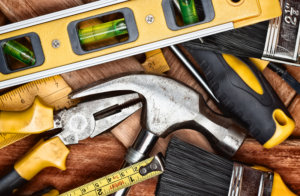Life Tools: Discovering Your Toolbox

Can you imagine if young adults were to embark on the world of college, marriage, partnership and parenting with the life skills and tools they need to create successful, communicative relationships? This is a real possibility. As a parent, you can encourage that possibility now.
It takes confidence for a child to be themselves, to work hard, to enjoy the journey. It takes self-love, and a sense of self worth. And that takes a personal toolbox, well-developed skills and techniques for self-management and self-respect.
Building A Personal Toolbox of Life Tools
Everyone acquires personal tools at different points in their life. What if we could actually make sure that all kids get what they need? Wouldn't it be great if all children were to believe that they can handle life's ‘situations' as they arise? If they recognized that they have tools or support to help them? What if our kids believed that when they make mistakes, they can learn from their experiences.
Everyone's journey is unique. Everyone has bumps on their path – pebbles, hills, and mountains. These obstacles are our lessons. They reset our navigation, our thinking. One way or another, children find their way through the obstacle course of their childhood.
Some children are problem solvers, and some need more support. Some children grow up loving themselves, while others grow up living in doubt. All of them have strengths and capabilities. Some of them just have an easier time discovering their strengths than others.
Once people learn about their tools, they begin to use them more and more. Children and adults thrive when they understand all that they are capable of. As parents, we need to empower our kids to discover the tools in their personal toolbox!
I am passionate about teaching children to discover their Toolbox Foundations. Like the Lion, the Scarecrow, and the Tin Man, we carry our tools inside us, but we are often unaware that they are there. To create our life, we need to look from the inside out. This starts with awareness, continues with new discoveries or learning, and moves into planning and shaping.
Article continues below...
What's Your Parenting Style?
Take a quiz to find out what kind of a parent you are.
Four tools help lay a foundation for happiness (for children and adults):
1. Name It to Tame It
Embrace your feelings – all of them are Ok. Everyone has the right to identify their feelings. As Dr. Daniel Siegel explains, when children are validated that their feelings have meaning and significance, when they are taught about their brain and given examples of possible reactions and behaviors (social thinking), they then have the ability to respond differently. Building and nourishing positive neuro-pathways is critical for healthy development. These pathways are built, reinforced and pruned throughout life.
2. Be Mindful
Pema Chodren shares that to be in your feeling, the preverbal stage before you react to something, gives you the space to feel your feeling. Using guided meditation, deep breathing, and tapping can assist children to be in their bodies and be present. Even a toddler can learn about the tool of mindfulness early on!
3. Ignore What Other People Think
As Dr. Wayne Dyer shares, what others think of you is none of your business. I am trying to learn this as an adult, and it's not easy. With every cell in my body I want my daughter and the children I work with to love themselves, feel confident in themselves, and not to internalize societal pressures.
4. Find a Mentor or Coach
My friend and coach, Elaine Taylor-Klaus, explains that “a coach offers perspective without critical judgment, allowing you to learn and create opportunities for change without getting mired in self-defeat.” The support of another human being who is a “generous listener,” who offers intentional love and kindness, is an incredible tool. Coaching is a way of encouraging, and it can come from anywhere – a mother, grandmother, teacher, positive friend or professional coach. We know the benefit a child receives when they receive coaching, because we know what a difference it makes when we have a confidante to rely on, to share our successes and our failures.
When we discover and use our strengths, we own our power. There is no greater gift than to see a child – or an adult – stand up tall and smile as they confidently live their life fully, with confidence and joy. What more do we want for our kids than that, really?
Suggested Resources:
Dr. Daniel Siegel – The Whole Brain Child www.drdansiegel.com
Pema Chodren - www.goodreads.com/author/quotes/8052.Pema_Ch_dr_n
Dr. Wayne Dyer - www.drwaynedyer.com
Elaine Taylor-Klaus, essayist, https://www.ImpactParents.com
Parenting 2.0 - https://parenting2pt0.org/
Kelly Dorfman - What's Eating Your Child (the tool connecting food and behavior) www.kellydorfman.com
Brain Development Packets (English & Spanish, ages birth - 5 yrs) - www.braininsightsonline.com
Thank you to Melissa Schoene, M.S., science educator for her contribution to this article. Her passion for motivating people to learn inspires me.

